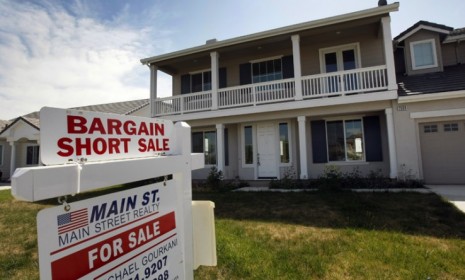Short sales: The answer to America's housing crisis?
To sidestep the painful and expensive foreclosure process, lenders begin offering delinquent borrowers cash to sell their homes for less than they owe

A free daily email with the biggest news stories of the day – and the best features from TheWeek.com
You are now subscribed
Your newsletter sign-up was successful
Banks are stepping up their efforts to get troubled mortgages off their books by offering delinquent homeowners cash incentives to sell their properties at a loss. Are these "short sales" a smart way to clear out the glut of houses in danger of foreclosure and start a housing industry rebound — or will they just depress prices further? Here's what you should know:
What exactly is a short sale?
A transaction in which a house sells for less than the amount the owner owes the bank. The bank agrees to let the homeowner off the hook, and considers the loan paid in full, even though it's not getting enough money to cover the principal remaining on the existing mortgage.
The Week
Escape your echo chamber. Get the facts behind the news, plus analysis from multiple perspectives.

Sign up for The Week's Free Newsletters
From our morning news briefing to a weekly Good News Newsletter, get the best of The Week delivered directly to your inbox.
From our morning news briefing to a weekly Good News Newsletter, get the best of The Week delivered directly to your inbox.
Why would either side want a short sale?
The seller gets out of a loan that he or she couldn't afford to pay back. And banks win too, because their losses on short sales are about 15 percent less than on foreclosures. In some ways, that's because short sales are quicker. Last year, the average short sale took 123 days from listing to closing on a new sale, while foreclosure paperwork typically took 348 days, followed by 175 days to sell the home.
Can banks afford short sales?
They're starting to realize that they can. Short sales accounted for 9 percent of all home sales in November 2011, up from 2 percent in January 2008, as the crash began. In the typical foreclosure process, struggling homeowners can end up essentially living rent-free for years before banks jump through the legal hoops necessary to force them out. Besides, Realtor Trent Chapman tells Bloomberg, many lenders have purchased troubled mortgages from other banks at a discount, so they can forgive a chunk of outstanding debt, offer cash as bait, and still wind up making a profit.
A free daily email with the biggest news stories of the day – and the best features from TheWeek.com
So banks are actively encouraging short sales?
Yep. Banks are offering delinquent homeowners as much as $35,000 — and giving up the right to go after unpaid debt — to get them to sell at a loss and move on. And the federal Home Affordable Foreclosure Alternatives program offers homeowners another $3,000 to go through with a short sale.
Is this really a win-win?
In a way. Banks are betting that clearing out the glut of looming foreclosures won't just improve their balance sheets, says Ben Walsh at Business Insider, but speed up a "broader and sustained economic recovery." But what will it do to the housing market in the near term? "As such deals continue," says Felix Salmon at Reuters, "and the homes then get dumped onto the market at any price, they will only serve to further depress the U.S. housing market," and "act as an incentive for homeowners to stop paying their mortgage and start holding out for a big check in return for leaving their homes quietly. The whole thing is an unholy and unnecessary mess."
Sources: Bloomberg, Business Insider, Realtor.org, Reuters
-
 The Olympic timekeepers keeping the Games on track
The Olympic timekeepers keeping the Games on trackUnder the Radar Swiss watchmaking giant Omega has been at the finish line of every Olympic Games for nearly 100 years
-
 Will increasing tensions with Iran boil over into war?
Will increasing tensions with Iran boil over into war?Today’s Big Question President Donald Trump has recently been threatening the country
-
 Corruption: The spy sheikh and the president
Corruption: The spy sheikh and the presidentFeature Trump is at the center of another scandal